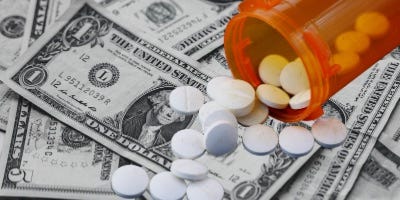How to (maybe) get drugs for cheaper
What we’ve learned, and how you can help us learn more
Hey! First Aid Kit is moving from Substack to our own website.
If you’re subscribed but First Aid Kit has stopped hitting your inbox, try whitelisting us, and make sure you’re subscribed. And you can contact us here.
Hey there—
As you’re probably painfully aware, too many of us pay too much for drugs. Surveys show a quarter of Americans skip taking their medicine because of the cost.
And way more people than that will see the price tag for a drug they’ve been prescribed and ask, “WHAA? I’m supposed to pay HOW MUCH for this?”
I’ve learned a fair amount about things you can do in that situation, and we’re consolidating them here, with a big thanks to Harvard researcher Ben Rome.
He’s also a doc, and when we talked recently, he said this question — “Doc, can I afford this medicine you’re prescribing?” — comes up every single week.
So he and some colleagues recently published a paper outlining their go-to strategies.
It’s paywalled and dense— so I’m gonna sum it up.
Fair warning: As Rome said to me, all these approaches have their limitations.
“These tools don't really address the underlying problems,” he said— meaning high prices that insurance often doesn’t protect us from— “but are really designed to sort of provide band-aid fixes.
But a band-aid can be better than nothing. Sometimes a lot better than nothing.
And we’re looking for new tools, so at the end of this post, I’m gonna ask you to help us with that reporting.
Meanwhile, here’s Ben Rome’s list of strategies, each with its own limitations.
1. Coupons and “co-pay cards” from drugmakers
Brand-name drugmakers often offer cards and coupons that can help knock down your co-pay on expensive drugs.
Your pharmacist may do a search for you. Or you can Google your drug’s name, plus “co-payment card.” And the nonprofit needymeds.org has a search tool.
But: People who are uninsured or on Medicare, Medicaid, Tricare, and VA healthcare can’t use these cards, because of a federal law.
2. Coupons from GoodRx and other sites
These are discounts negotiated through middleman companies like pharmacy benefit managers. And especially for generic drugs, they can offer a better deal than your insurance.
But: When you use these coupons, your insurance doesn’t kick in — and your payment doesn’t count toward your deductible.
3. Discount pharmacies: Online and off
Mark Cuban’s Cost-Plus Drugs is the best-known online shop here. But Ben Rome says alternatives like Amazon, Walmart, Costco, and others are worth checking out. Needymeds.org has a list of in-person pharmacies with lists of $4 generics.
But: With Mark Cuban’s site and some others, it’s like GoodRx: Your insurance doesn’t kick in, and what you pay doesn’t count towards your deductible.
4. Patient Assistance Programs
Drugmakers offer these to folks based on financial need. Again, needymeds has a search tool.
But: Each program sets its own criteria for “financial need,” which can be strict, and the application process can take a lot of time and energy.
5. International online pharmacies
There are pharmacies in Canada that ship to the U.S. It’s technically illegal to import drugs, but as I learned from Ben Rome, the FDA says it’s basically OK to bring in up to a 90-day supply for yourself.
But: Do some due diligence, to make sure the supplier is legit. You can use the tool Pharmacy Checker to verify international online pharmacies and compare prices.
6. Recommendations from your insurance company
Sometimes, they’re “recommending” drugs that are better for them — for their bottom line — but may not actually work as well for you. So you and your doctor are the experts here.
But Ben Rome says, sometimes your doc will tell you: The cheaper alternative is just fine:“There's examples — like tablets and capsules — where like there's just two different formulations of a drug available,” he said. “And who knew that the capsule was five times more expensive than the tablet?”
But: This is between you and your doctor. (I know: Not enough of us have ongoing relationships with trusted docs).
Of course: This is a lot to chase down!
Yep. A safety net this ain’t. Especially, as Ben Rome told me: “If you take 10 medicines, and now your doctor is telling you that ‘This one's going to be less expensive at CVS. And this one's going to be less expensive if you order it online.’ It gets really confusing really fast.”
OK, now: Time to ask for your help.
We’re collecting YOUR stories — and lessons. So we can pool our knowledge.
So I’m asking: When you’ve been in a situation of staring down a way-too-high pharmacy bill, what have you done?
Maybe it was one of the strategies above — or maybe it was something else.
And: What have you learned?
Even if the lesson isn’t a happy one. Knowing where the dead ends are — that’s important too.
You can share it all right here: armandalegshow.com/drugs.
Over the next month or two, we’ll dig into everything you bring us. We may call you for more details. And we’ll call more experts, to get answers to some of your questions.
Then, this spring, we’ll start sharing what we learn.
So whatever you’ve got— tips, questions, good news or bad— please take a minute and share it here: armandalegshow.com/drugs
And please, pass this around. You probably know somebody who could use Ben Rome’s tips. And we’ll want to hear from them too.
Thanks!
Dan
P.S. This newsletter is coming back in a new form soon, and publishing more often. So stay tuned for that.
Till then, take care of yourself,


